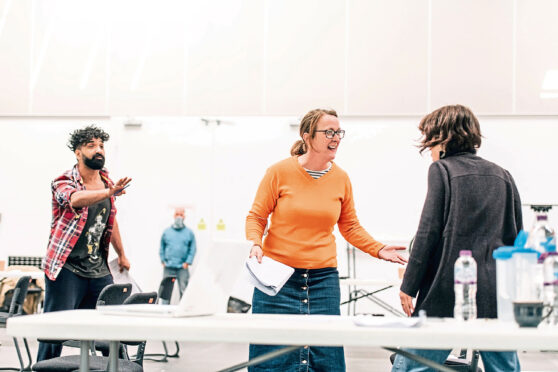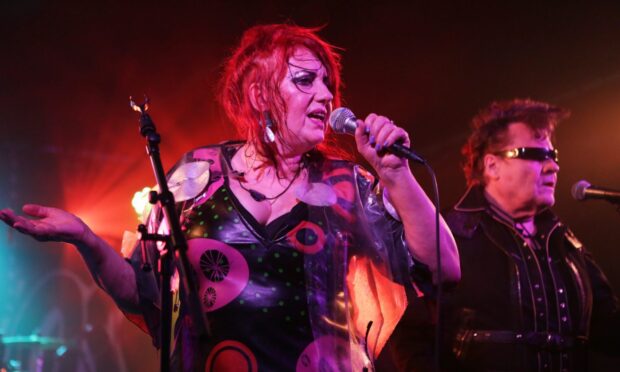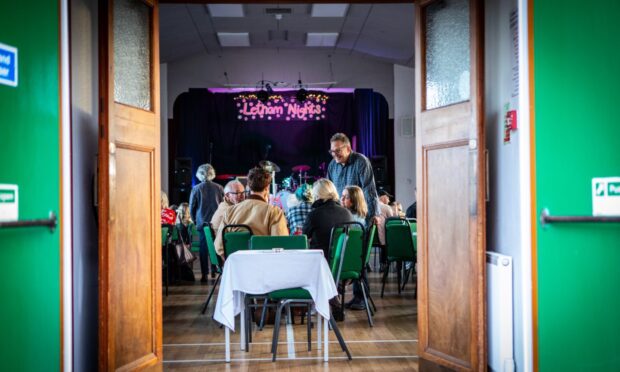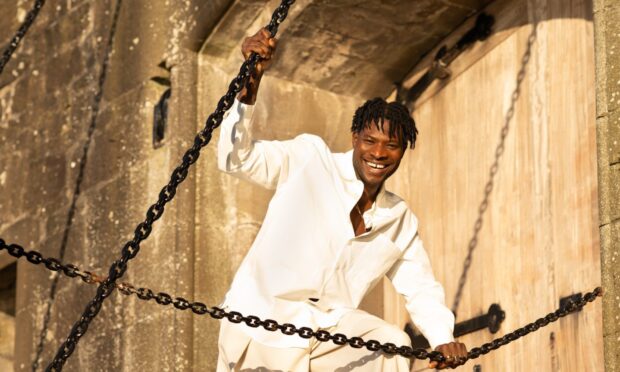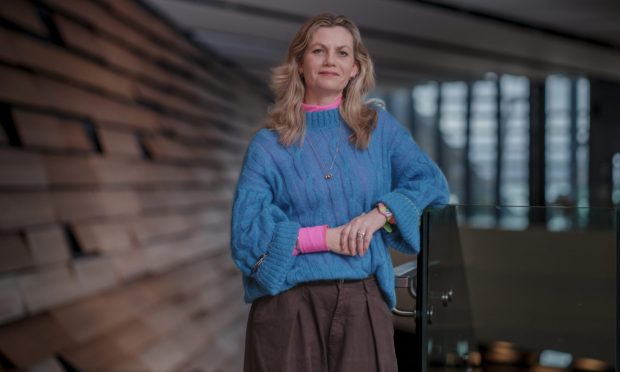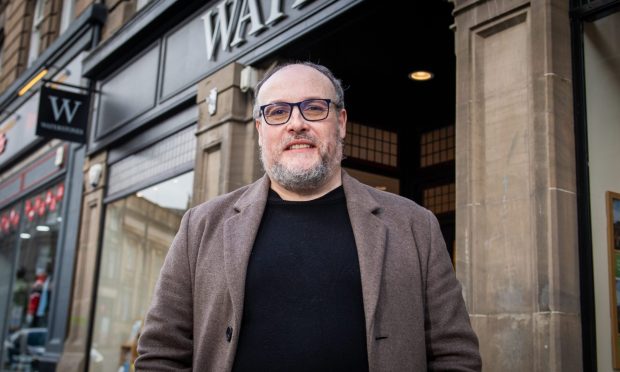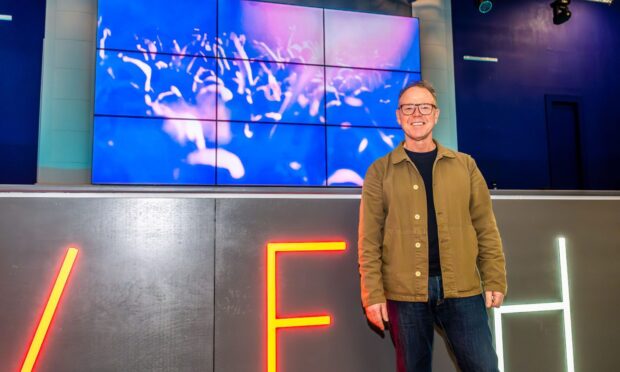Five years ago, playwright Kieran Hurley first took an interest in the Norwegian playwright Henrik Ibsen’s 1982 play An Enemy Of The People.
But an adaptation wasn’t on his mind back in 2016. He simply wanted to take a look at it again, so he asked on social media if anyone he knew had a copy.
It was director Finn den Hertog, whose Dundee Rep reopening play Wings Around Dundee has just finished, who responded.
An evergreen play
“I assumed Kieran was going to adapt the play, so I got in touch,” recalls den Hertog. “He said ‘no’, and I said, well that’s exactly what you should do!
“For good or bad, it’s an evergreen play; it’s never not relevant. At the time, we thought we were making a Brexit allegory or something about Trump, but in the intervening years that’s ebbed and flowed.”
In Ibsen’s original, Dr Thomas Stockmann discovers that the new spa that has recently been opened in his rural home town — an economic boost devised by the mayor, his brother Peter — is contaminated, and he attempts to get the truth out there. This knowledge, however, would surely close the spa down and deal a blow to all the townspeople who see an economic benefit from the new attraction.
Knowledge vs populism
“When I sat down to properly think about the play, it felt like something very timely to now,” says Hurley, of his reaction after speaking to den Hertog.
“Its central antagonism is between big ideas of scientific reason, expert knowledge and Enlightenment principles of truth and fact, versus popular will, a kind of mass populism.
“All that stuff was very rich in the air around the Brexit vote and the election of Trump, but it hasn’t gone away since. It still seems very pertinent to the direction of our world and our politics. It all pings off the play as I read it, and I thought: ‘Well, OK. We should do this one.’”
National Theatre
Hurley and den Hertog had the idea in 2016, pitched it to the National Theatre of Scotland in 2017, and Hurley set about writing it that year and the next, even as the adaptation of his hit rave play Beats was being developed as a film.
A planned staging in 2019 didn’t happen, for the benign reason that it didn’t fit with the NTS’s schedule — and then Covid arrived shortly after.
“We thought we had a play that was timely to now, to Britain in the 21st Century, and that still remains the case,” says Hurley. “Then Covid happens and it gets cancelled. We’re thinking: ‘Well, this is surreal…’
Pandemic dilemma
“We already thought it had a relevance to now, but at the heart of the play is this public health question: Do you best serve the needs of the people through immediately shutting everything down in order to preserve lives, or by keeping everything open in order to stave off economic disaster?
“That’s a central question of Ibsen’s play, and it remains a central question in our play — a play that was getting pulled from rehearsal just as that question was being asked in real life.
“You remember, just before we went into the first lockdown, there was that thing about herd immunity, and all these memes are rolling through Twitter of Boris Johnson as the Mayor in Jaws: ‘We’ll keep the beaches open!’
“That’s the central argument between the two lead characters in the play, so having the play cancelled for reasons that were essentially to do with its narrative playing out in real life was a genuinely dizzying experience. In that sense, it became newly relevant again.”
Entertaining Night
Although he expects everyone who sees the play to believe the joke in it about the mayor from Jaws was written after the character became an online meme during the Covid crisis, Hurley points out it was in there from an early, pre-Covid draft.
In fact, as he and den Hertog discussed the play, he came to the realisation that in storytelling terms, “the first half of An Enemy Of The People is basically Jaws, and the second half is Moby Dick” — a fact also remarked upon by Jaws’ screenwriter, Carl Gottlieb.
“All these things make you go, my God, it’s scary how relevant this is,” says den Hertog. “Hopefully it’s still an exciting, thrilling, entertaining night at the theatre, though. We’ve turned this brilliant piece of storytelling into a contemporary Scottish thriller, set in the present day, which uses social media as a story element.
Digital age
“In the original, the townspeople appear in the final scene as a braying mob, so we thought, what does that look like in 2021? It looks like a social media pile-on.”
“One of the elements of it is the media,” adds Hurley.
“In Ibsen’s original, he gets a lot of plot value out of whether or not the local paper’s going to publish the doctor’s article. Of course, that’s very different in our world, because you could self-publish it on Medium and tag in BBC News, which hurries things along.
Role of the media
“This opened up the timely question: What’s the role of media and social media in a post-truth digital age, where one person gets monstered in quite a deliberate, vilifying way?”
“It just felt like the right story to tell,” continues den Hertog. “When I saw Kieran looking for a copy of An Enemy Of The People I thought, this is Scotland’s premier political playwright, an incredible voice, so of course he should be writing An Enemy Of The People.
“I was looking for a classic to direct because, as an emerging director, it’s often new plays you’re given, and the classics are given to the more experienced directors. I wanted to have a shot at something big and classical, but what if it was also brand new? That mash-up of those two things has resulted in The Enemy.”
New setting
This retitled play is the both same and different from Ibsen’s original.
The setting is now a depressed Scottish town, promised new economic vitality through the hurried pushing through of a Center Parcs-style resort named The Big Splash.
When the truth about its contamination threatens to come out, the intrigue doesn’t occur over weeks of negotiation with the local newspaper magnate and the head of the homeowner’s association, but over 24 hours with a noisy chorus of onscreen social media messages, and the attentions of a particular media personality and influencer.
Gender swap
The lead roles have also been gender-swapped — Dr Thomas and mayor Peter are Dr Kirsten and local council provost Vonnie.
“She’s fearless in her pursuit of telling the truth,” says Hannah Donaldson, who plays Kirsten. “She’s a strong-minded single mother, but she’s flawed. She’s easily led, she’s hot-headed, she doesn’t always make the best choices.
“I think most people would agree that she’s on the right side of the argument, but does she go about it the right way, or does she get ahead of herself? It’s fun to play someone who’s as complex and complicated, who’s ruthless and fierce, with strong ethics and opinions. All the fun stuff.”
“I’ve played politicians before,” says Gabriel Quigley, who plays Vonnie. “It doesn’t seem strange to me — my dad was a Modern Studies teacher, and as I’ve got older, I’ve tended to play journalists or politicians, so I’ve got a lot of sympathy for them.
Similar voices
“I played the journalist Deborah Orr in a National Theatre of Scotland show called Enquirer, and we became friends — she’s from Wishaw, which is near where I’m from in Lanarkshire, and we’ve got very similar voices, which is why I was cast as her (in the audiobook version of Orr’s memoir Motherwell, published before she died).
“In her book, she talks a lot about the decline of the post-industrial landscape in Scotland and what’s happened to towns like Motherwell, and this play deals with that as well. How do you turn it around?
“That’s what Vonnie is trying to do — to bring it back, to give people something because they’ve had nothing for quite some time, since the decline of heavy industry. Plus the play is about two sisters who are at war, so that’s always going to be good drama.”
Aspects of Society
Hurley notes that An Enemy Of The People keeps resurfacing onstage because its story and the implications of it speak to various aspects of society; Arthur Miller’s version was a hit in liberal America, for example, and another ran in Nazi Germany. What does he want the audience to take from his adaptation?
“I try to not be too prescriptive about that,” says the playwright.
“At the heart of the play is a massive argument, a big discussion about themes that feel pertinent to how we live just now. But mostly I just want people to enjoy being back in a theatre again, to feel like they’re seeing something that’s relevant to their lives, but which gives them a good night out, that justifies the babysitter and reminds us all what’s so special about live theatre.
“I want the story to speak for itself, because it’s all there.”
